Unit 4 Why don’t you talk to your parents?课件(共78张PPT) 人教新目标(Go for it)版八年级下册
文档属性
| 名称 | Unit 4 Why don’t you talk to your parents?课件(共78张PPT) 人教新目标(Go for it)版八年级下册 | 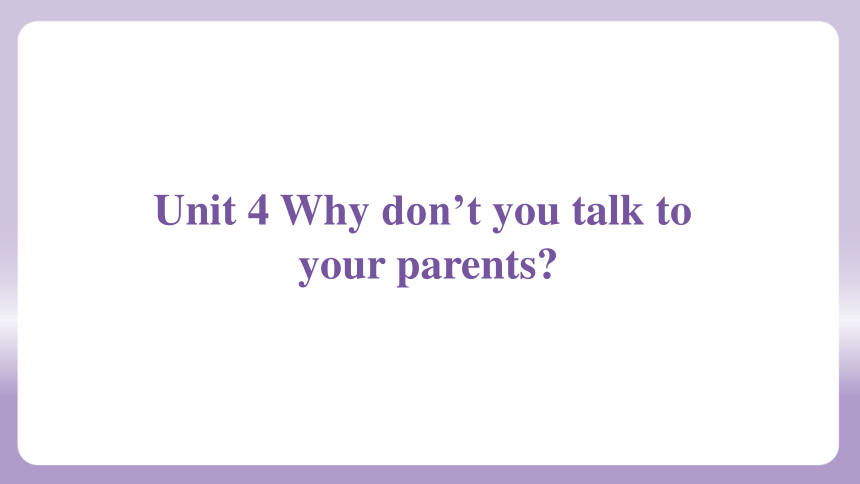 | |
| 格式 | pptx | ||
| 文件大小 | 1.5MB | ||
| 资源类型 | 教案 | ||
| 版本资源 | 人教新目标(Go for it)版 | ||
| 科目 | 英语 | ||
| 更新时间 | 2024-05-16 21:34:35 | ||
图片预览

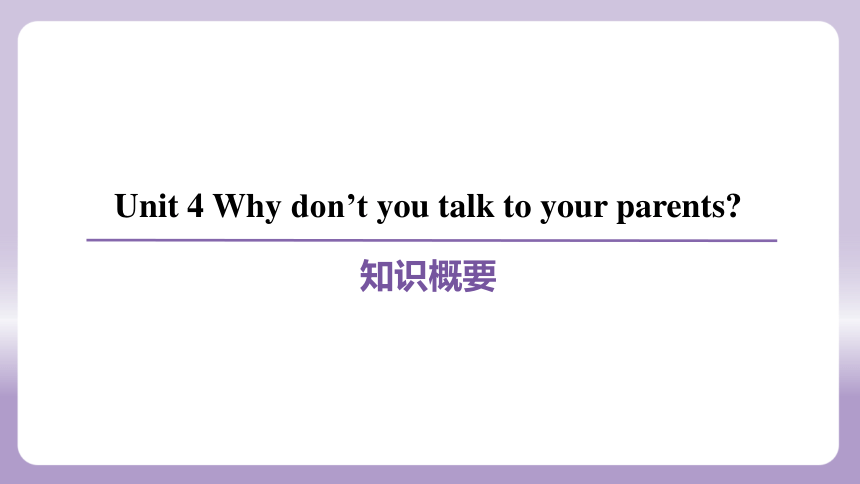
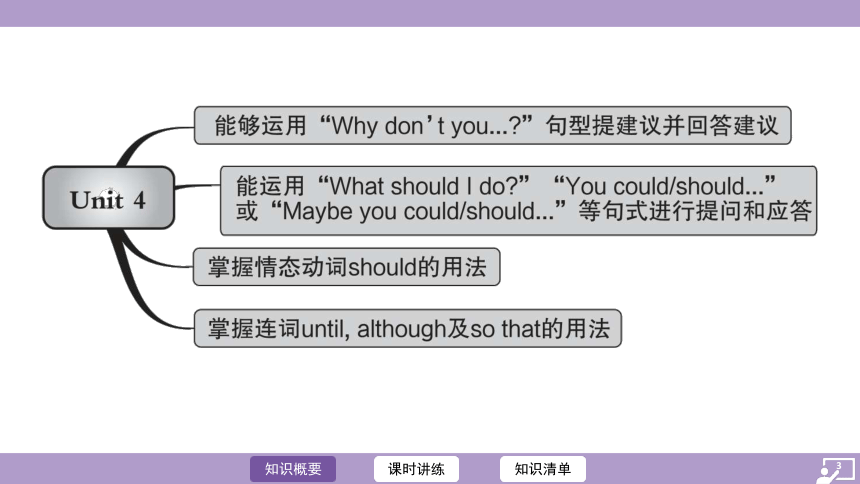
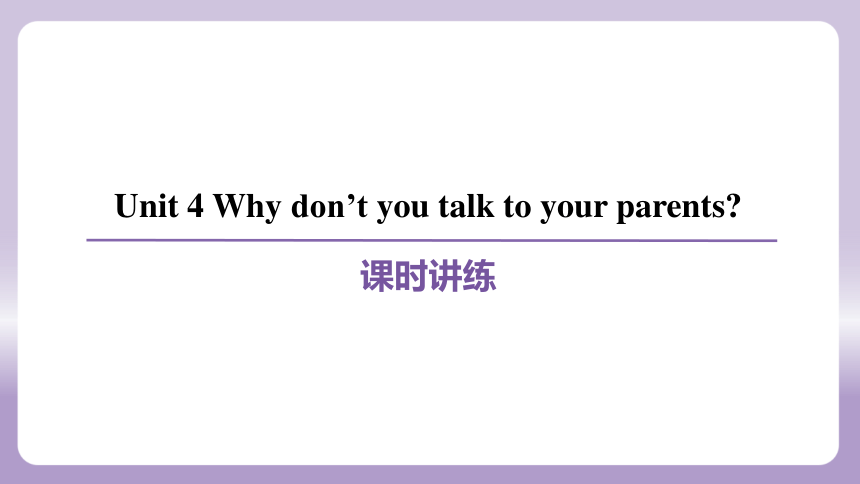
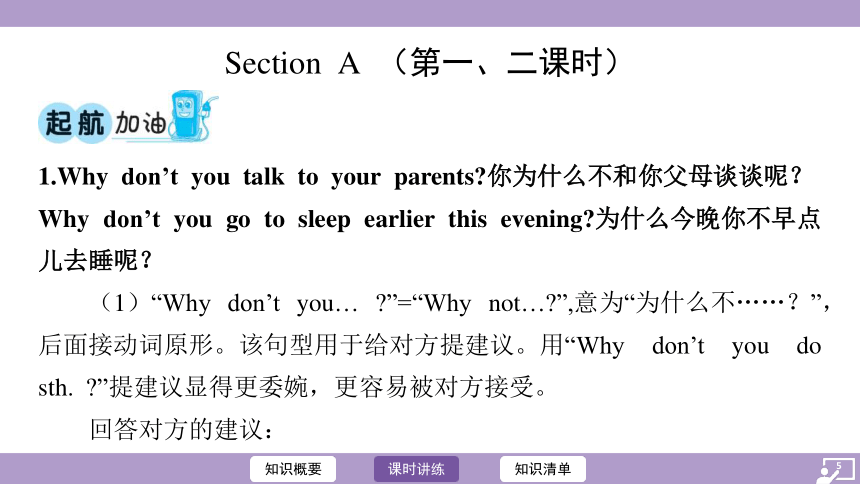
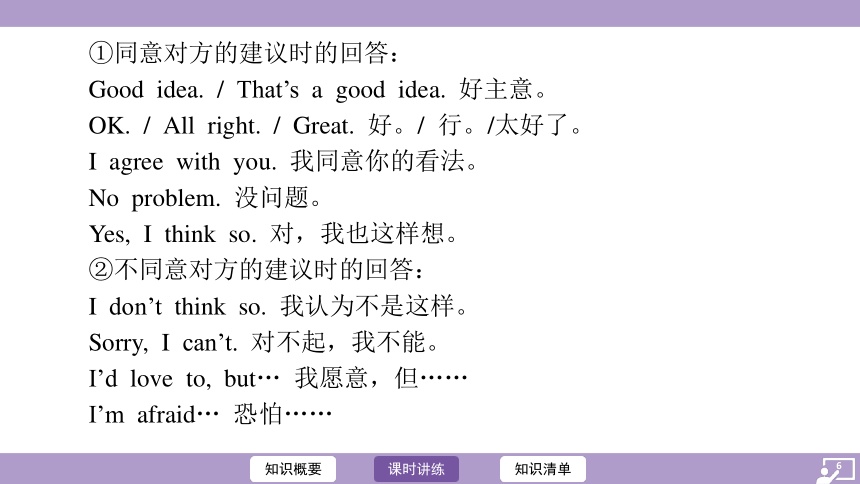

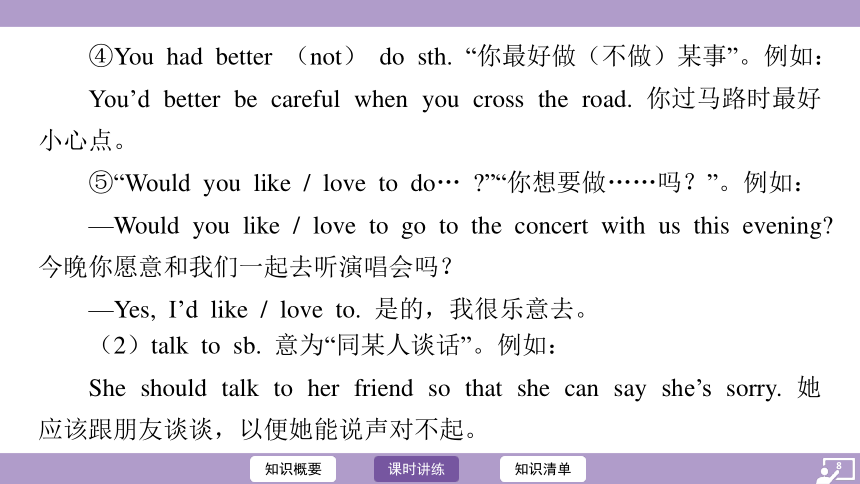
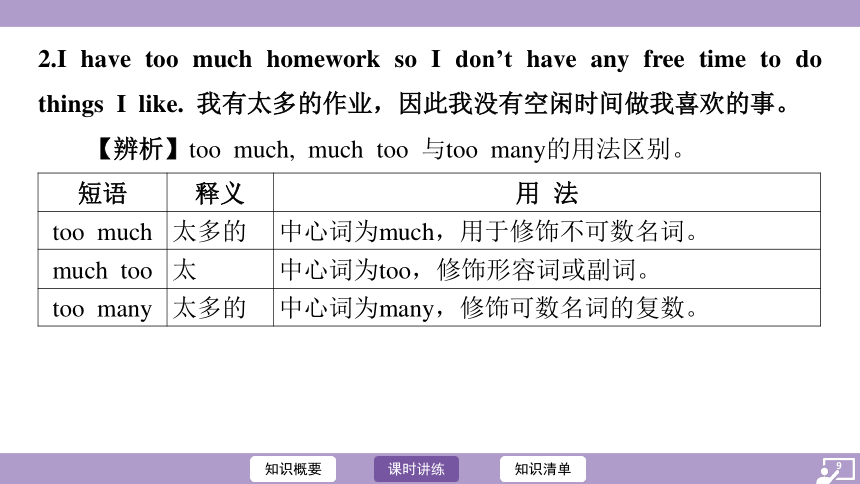
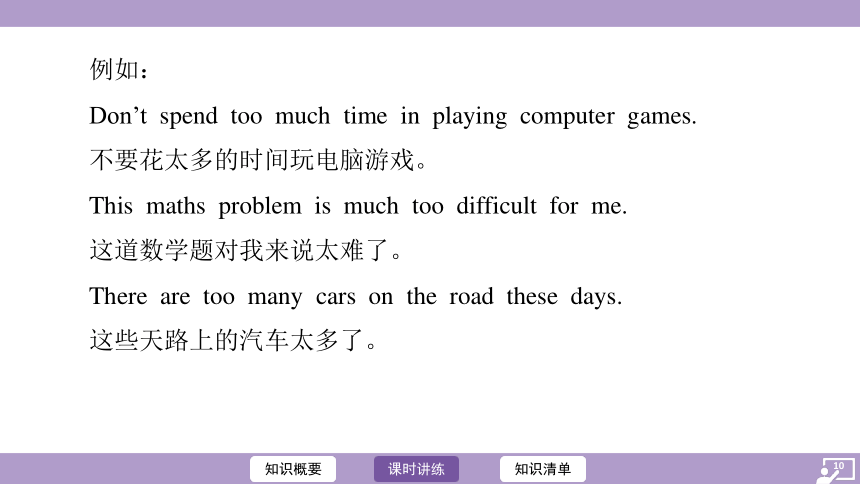
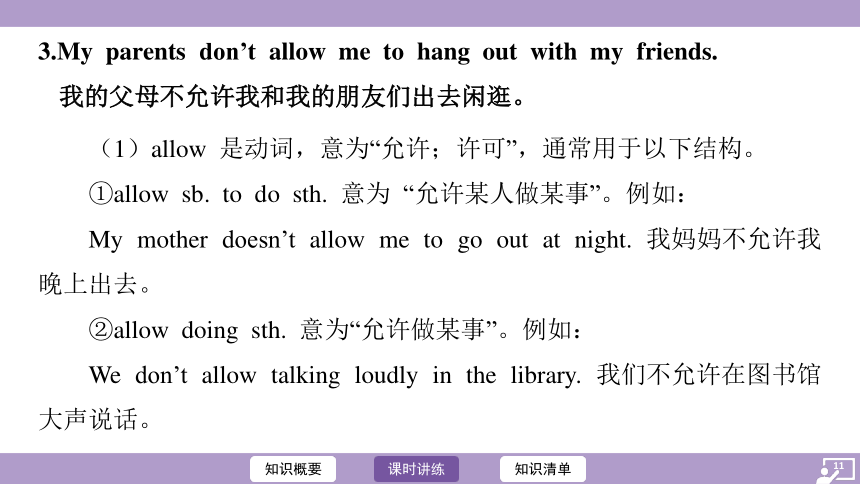
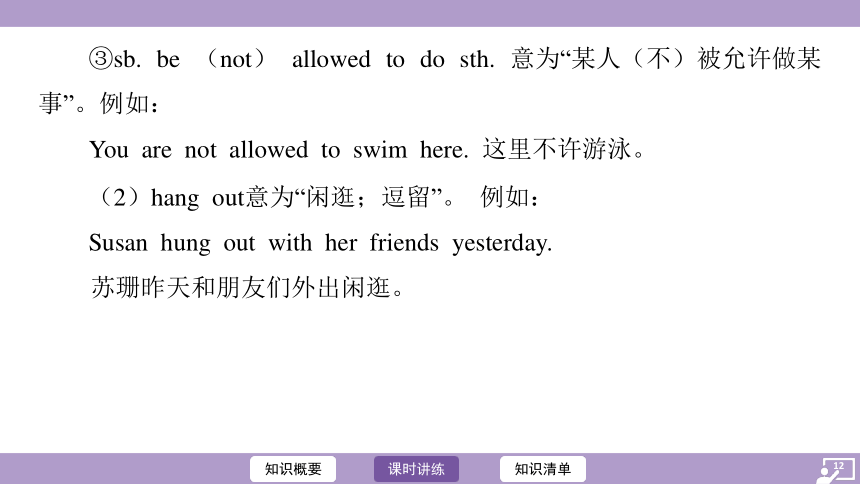
文档简介
(共78张PPT)
Unit 4 Why don’t you talk to
your parents
Unit 4 Why don’t you talk to your parents
知识概要
Unit 4 Why don’t you talk to your parents
课时讲练
Section A (第一、二课时)
1.Why don’t you talk to your parents 你为什么不和你父母谈谈呢?
Why don’t you go to sleep earlier this evening 为什么今晚你不早点儿去睡呢?
(1)“Why don’t you… ”=“Why not… ”,意为“为什么不……?”,后面接动词原形。该句型用于给对方提建议。用“Why don’t you do sth. ”提建议显得更委婉,更容易被对方接受。
回答对方的建议:
①同意对方的建议时的回答:
Good idea. / That’s a good idea. 好主意。
OK. / All right. / Great. 好。/ 行。/太好了。
I agree with you. 我同意你的看法。
No problem. 没问题。
Yes, I think so. 对,我也这样想。
②不同意对方的建议时的回答:
I don’t think so. 我认为不是这样。
Sorry, I can’t. 对不起,我不能。
I’d love to, but… 我愿意,但……
I’m afraid… 恐怕……
【拓展】表示建议的其他句型:
①“What / How about doing… ” “做……怎么样?”。例如:
What/ How about going to see a film 去看电影怎么样
②“Let’s do…!” “让我们做……吧!”。例如:
Let’s play volleyball after school! 放学后让我们一起打排球吧!
③“Shall we do… ” “我们做……好吗?”。例如:
Shall we go climbing this weekend?我们这个周末去爬山好吗
④You had better (not) do sth. “你最好做(不做)某事”。例如:
You’d better be careful when you cross the road. 你过马路时最好小心点。
⑤“Would you like / love to do… ”“你想要做……吗?”。例如:
—Would you like / love to go to the concert with us this evening 今晚你愿意和我们一起去听演唱会吗?
—Yes, I’d like / love to. 是的,我很乐意去。
(2)talk to sb. 意为“同某人谈话”。例如:
She should talk to her friend so that she can say she’s sorry. 她应该跟朋友谈谈,以便她能说声对不起。
2.I have too much homework so I don’t have any free time to do things I like. 我有太多的作业,因此我没有空闲时间做我喜欢的事。
【辨析】too much, much too 与too many的用法区别。
短语 释义 用 法
too much 太多的 中心词为much,用于修饰不可数名词。
much too 太 中心词为too,修饰形容词或副词。
too many 太多的 中心词为many,修饰可数名词的复数。
例如:
Don’t spend too much time in playing computer games.
不要花太多的时间玩电脑游戏。
This maths problem is much too difficult for me.
这道数学题对我来说太难了。
There are too many cars on the road these days.
这些天路上的汽车太多了。
3.My parents don’t allow me to hang out with my friends.
我的父母不允许我和我的朋友们出去闲逛。
(1)allow 是动词,意为“允许;许可”,通常用于以下结构。
①allow sb. to do sth. 意为 “允许某人做某事”。例如:
My mother doesn’t allow me to go out at night. 我妈妈不允许我晚上出去。
②allow doing sth. 意为“允许做某事”。例如:
We don’t allow talking loudly in the library. 我们不允许在图书馆大声说话。
③sb. be (not) allowed to do sth. 意为“某人(不)被允许做某事”。例如:
You are not allowed to swim here. 这里不许游泳。
(2)hang out意为“闲逛;逗留”。 例如:
Susan hung out with her friends yesterday.
苏珊昨天和朋友们外出闲逛。
4.I’m really tired because I studied until really late last night, so I didn’t get enough sleep. 我真的很累,因为我昨晚学习到真的很晚,所以我睡眠不足。
(1)until用于肯定句中时,句子的谓语动词必须是延续性动词;若句子的谓语动词是非延续性动词,则要用“not… until… ”结构,表示“直到……才……”。例如:
Frank watched the Football World Cup until 11:00 last night. 弗兰克昨晚看世界杯足球赛一直看到11点。
We mustn’t cross the street until the traffic lights are green. 直到交通灯变成绿色的,我们才能过街道。
【注意】连词until意为“直到……为止;到……时”,引导时间状语从句,常放在主句之后,也可以放在主句之前。主句为一般将来时,从句要用一般现在时表示将来。例如:
I won ’t believe it until I see it with my own eyes. 直到亲眼看见,我才会相信。
(2)当not until位于句首时,主句要倒装。例如:
Not until 2023 did he return to his hometown. 直到 2023年他才回到家乡。
5.Well, you should call him so that you can say you’re sorry.
哦,你应该给他打电话以便你能说声对不起。
so that的用法。
(1)引导目的状语从句。so that 意为“以便;为的是”时,引导目的状语从句,一般放在主句之后,且不用逗号隔开。目的状语从句表示动机(即一种可能性),而非事实。此时可与in order that 换用;从句中常含有情态动词 may, can/could, should, would 等。例如:
Please answer the question in a loud enough voice so that all the class may hear. 请用足够大的声音回答问题,以便全班都能听到。
(2)引导结果状语从句。so that 意为“以至于;结果”时,引导结果状语从句,陈述的是客观事实,常常不带情态动词。主从句之间可以用逗号隔开。此时不能与in order that 换用。例如:
Linda didn’t plan her time well, so that she didn’t finish her work on time. 琳达没有把时间计划好,所以没能按时完成工作。
7.Instead he watches whatever he wants until late at night. 相反,
他却可以看他喜欢的任何节目,一直看到很晚。
(1)instead的用法。
①instead位于句首,表示“反而;相反”,是副词,后面不接其他的词,在句首时常用逗号隔开,表示前面的事没做,而做了后面的事。例如:
I didn’t go to see a movie last night. Instead, I watched a volleyball match on TV. 昨晚我没去看电影,而是在电视上看了一场排球比赛。
②instead位于句尾,表示“作为代替,而是”。例如:
If you can’t go to take part in the activity, I can go instead. 如果你不能去参加这个活动,我可以代替你去。
③instead of是介词短语,意为“代替;而不是”,后跟名词、代词、动词-ing形式。例如:
She went to the museum instead of going to the library. 她去了博物馆而不是图书馆。
(2)句中whatever引导一个宾语从句,作动词watches的宾语。whatever 意为“无论什么”。例如:
You can take whatever you like. 你喜欢什么就拿什么。
【拓展】whatever还可以引导让步状语从句,相当于no matter what,意为“无论什么,不管什么”。例如:
Whatever the problems are, never give up!无论有什么问题,永远不要放弃!
8.I don’t think this is fair. 我认为这不公平。
“I don’t think+(that)宾语从句”表示“我认为……不……”,that在宾语从句中起引导作用,无意义,常可省略。从形式上看don’t否定的是主句的谓语动词think,但在意义上否定的是从句的谓语动词,这叫作“否定转移”。例如:
I don’t think she can play the piano. 我认为她不会弹钢琴。
【拓展】当think, believe, expect, suppose, imagine等词后跟宾语从句,且主句的主语是第一人称I或we时,从句若要表达否定意义,则将否定词转移到主句上,而从句用肯定形式。例如:
I don’t believe he can work out the problem. 我相信他解不出这个问题。
9.If your parents are having problems, you should offer to help. 如果你的父母遇到问题,你应该提供帮助。
offer是动词,意为“主动提出;自愿给予”。常用的结构如下。
(1)offer to do sth. 意为“愿意(做某事);主动提出做某事”。例如:Daming often gives his seat to the old on the bus. 在公共汽车上大明经常把他的座位让给老年人。
(2)offer sb. sth. = offer sth. to sb. ,意为“向某人提供某物”。例如:
She offered me a cup of tea. =She offered a cup of tea to me. 她给了我一杯茶。
一、单项选择。
( ) 1.— ______
—My watch doesn’t work.
C
A.How did that happen B.What’s that C.What’s wrong
( ) 2.Why not ________climbing with us in the park
A
A.go B.to go C.going
( ) 3.________ Eric is only nine years old, he knows a lot.
B
A.Because B.Though C.While
( ) 4.My father didn’t go to bed ________ he finished his work
last night.
C
A.if B.when C.until
( ) 5.Miss Wang speaks very loudly ________ all the students can
hear her.
B
A.in order to B.so that C.such that
( ) 6.My teacher doesn’t allow us ________ others’ homework.
C
A.copy B.copying C.to copy
( ) 7.Giving ________ pressure is not good for children.
B
A.much too B.too much C.too many
小锦囊 pressure为不可数名词,要用too much还是too many修饰
( ) 8.We have no milk. Let’s have apple juice ________.
A
A.instead B.besides C.yet
( ) 9.—How are you ________ with your classmates
—Very well.
C
A.getting in B.getting off C.getting on
( ) 10.Frank offered ________ me with my maths last Saturday.
A
A.to help B.help C.helping
小锦囊 offer to do sth. 用于表示主动提出做某事。
二、根据汉语提示,写出正确的单词完成句子。
1.Sally often ______(提供) to give her seat to old men on the bus.
2.Don’t lose heart _________(无论什么) difficulties you meet.
3.You can borrow this book from the library,but you must _______
(归还) it on time.
4.The ________(关系) between the countries is very good.
5.There’s something _______(有问题的) with her ears, so she can’t
hear anything.
offers
whatever
return
relation
wrong
6.—Does your brother often______(争吵) with others
—No, he is very nice to others.
argue
7.Can you ______(猜测) the meaning of the new word
8.Helen is always________(紧张的) when she makes a speech in public.
9.I didn’t go to the meeting yesterday. Miss Li went to the meeting
_______(代替).
10.Body language is a very powerful tool of ______________(交流).
guess
nervous
instead
communication
三、用括号内所给单词的适当形式填空。
1.Dick is my ______(old) brother. He is three years older than I.
2.It’s _______(cloud) today. It seems that it is going to rain.
3.My best friend always offers ________(help) me.
4.I think the ______________(communicate) between friends is useful.
5._________(copy) others’ homework is not right.
elder
cloudy
to help
communication
Copying
6.They are________(worry) about making future plans.
7.His father doesn’t allow him ______(go) swimming alone.
8.Why not_____(have) a picnic this afternoon
9.I want to play soccer instead of _________(watch) TV.
10.I found a girl _______(cry) when I passed the corner.
worried
to go
have
watching
crying
四、从方框中选出恰当的选项,补全对话。有一项多余。
A: Welcome back to “The Problem Line”. Okay, it’s time for another call. _1.(____)
B: Hello! This i Mandy.
C
A. What should I do
B. You shouldn’t argue with your mom.
C. Hello,who’s calling
D. I think Mandy should ask her teacher for help.
E. Why not have a good talk with her
F. What’s your problem
B: I know, but she plans everything for me. I can’t even decide what
to wear on weekends.
A: Hi, Mandy. Welcome to “The Problem Line”. _2.(____)
B: Well, I’m having problems with my mom. When we talk about something, we always argue.
A: _3.(____) It is not right.
F
B
A. What should I do
B. You shouldn’t argue with your mom.
C. Hello,who’s calling
D. I think Mandy should ask her teacher for help.
E. Why not have a good talk with her
F. What’s your problem
A: That’s too bad. _4.(____)
B: I tried, but she never listened. She thinks I should listen to her because I’m her child.
A: Well, that’s a difficult problem. Dear listeners,who can give her suggestions
C: Hello, this is Victor. _5.(____) Maybe her mother will listen to her teacher.
B: OK. I’ll have a try. Thank you!
E
D
A. What should I do
B. You shouldn’t argue with your mom.
C. Hello,who’s calling
D. I think Mandy should ask her teacher for help.
E. Why not have a good talk with her
F. What’s your problem
五、从方框内选择适当的单词,并用其正确形式填空。每个单词只
能用一次。
offer why explain between proper however communicate
whatever nervous hang
Dear Mr. Hunt,
My problem is that I can’t get on with my family. Relations
1. . my parents have become difficult. They argued a lot,and I really don’t like it. It’s the only 2. . they have. I don’t know if I should say anything to them about this. When they argue, it’s like a big, black cloud 3. . over our home.
between
communication
hanging
Also, my elder brother is not very nice to me. He always refuses to let me watch my favorite TV show. Instead he watches 4. . he wants until late at night. I don’t think this is fair. At home I always feel lonely and 5. .. Is that normal What can I do
Sad and Thirteen
Dear Sad and Thirteen,
It’s not easy being your age, and it’s normal to have these feelings. 6. . don’t you talk about these feelings with your family
whatever
nervous
offer why explain between proper however communicate
whatever nervous hang
Why
If your parents are having problems, you should 7. . to help. Maybe you could do more jobs around the house so that they have more time for munication. Secondly, why don’t you sit down and communicate with your brother You should 9. . that you don’t mind him watching TV all the time. 10. ., he should let you watch your favorite show. I hope things will be better for you soon.
Robert Hunt
offer
proper
explain
However
offer why explain between proper however communicate
whatever nervous hang
Section B (第三、四课时)
1.I have to compete with my classmates at school. 在学校,我必须和我的同学们竞争。
compete是动词,意为“竞争;对抗”, compete with意为“和……竞争”。例如:
Life is like a race where we compete with others to go beyond ourselves. 生活就像赛跑,我们在和别人竞争,从而超越自己。
2.I take one of my two boys to basketball practice and my daughter to football training. 我让我的两个儿子中的一个选择练习打篮球,我的女儿选择足球训练。
practice作名词,意为“练习”,还可作动词,意为“练习;实践”。若表示“练习做某事”时,常用的结构为practice doing sth. 或practice sth. 。例如:
Nancy practices the violin every day. 南希每天练习小提琴。
Let us practice playing tennis after class. 让我们下课后练习打网球。
3.In some families, competition starts very young and continues until the kids get older. 在一些家庭,竞争很早就开始了,并一直持续到孩子们长大。
continue意为“继续;持续”。常用的结构如下。
(1)continue to do sth. 意为“做完一件事再继续做另一件事”。例如:
After drinking a glass of milk, I continued to do my homework.
喝了一杯牛奶后,我继续做作业。
(2)continue doing sth. 意为“做一件事中断后再继续做这件事”,即继续做原来的事。例如:
After a rest,she continues reading this novel. 稍作休息后, 她继续看这本小说。
4.And they are always comparing them with other children.
父母总是把他们和其他孩子作比较。
compare 是动词,意为“比较”,常用于以下结构。
(1)“compare…with… ”意为“把……与……比较/对比”。例如:
Parents shouldn’t always compare their children with others.
父母不应该总是把自己的孩子与其他的孩子比较。
(2)“compare…to… ”意为“把……比作……”。例如:
Shakespeare compared the world to a stage. 莎士比亚把世界比作
舞台。
People often compared children to flowers. 人们常常把孩子比作花朵。
一、单项选择。
( ) 1.It’s time______supper, Linda.
B
A.having B.to have C.have
( ) 2.—________ do you think of the new movie
—Very exciting.
C
A.How B.Who C.What
( ) 3.The last two sentences are unnecessary. You’d better ________.
C
A.cut up them B.cut out them C.cut them out
( ) 4.Please ________ this photo with that one, and then tell me
the differences between them.
B
A.compete B.compare C.explain
( ) 5.Although it was raining hard, they still continued ________
in the field.
A
A.working B.worked C.to work
( ) 6.Robert ________ sends e-mails to his friends.
C
A.some time B.sometime C.sometimes
( ) 7.I think you’d better practice ________ English every day.
A
A.speaking B.speak C.to speak
( ) 8.No one can tell what will ________ next.
B
A.return B.happen C.report
( ) 9.There are different ________ animals in the zoo. Some of
them are ________scary.
C
A.kind of;kinds of B.kinds of;kinds of C.kinds of;kind of
( ) 10.________, volunteering is both a chance to help others and
a good way to develop ourselves.
B
A.To my surprise B.In my opinion C.As a result
二、根据汉语提示,写出正确的单词完成句子。
1.After Jerry took a short break, he __________(继续) washing his car.
2.Be ______(快的), or you’ll miss the train.
3.________(也许) Helen will come to visit me this evening, I guess.
4.In my ________(观点), eating more vegetables is good for our health.
5.Simon likes sports and he often plays ________(足球) with me on
weekends.
6.Stop the music, dear. That noise is driving me __________(疯狂的).
continued
quick
Perhaps
opinion
football
crazy/mad
7.The cold weather _______(造成) many plants to die last year.
8.With the ____________(发展) of our country, more and more
people have cars.
9.If you always _________(比较) yourself with others, you may
have lots of pressure.
10.This painting is _______(典型的) of her early work.
caused
development
compare
typical
三、用括号内所给单词的正确形式填空。
1.Did you enter the writing ___________(compete)
2.Her parents give her a lot of ________(press).
3.Doctors say too much pressure isn’t good for a child’s ____________
(develop).
4.Mr. Miller goes to work by bike as ______(usually).
5.The Smiths are _______(type) Australian family.
competition
pressure
development
usual
typical
6.There are six _________(member) in my family.
7.Jack often has a______(quickly) breakfast and then hurries to school.
8.You shouldn’t _____(give) up your hope. Everything will be better.
9.Becky kept on_________(listen) to the song until she could sing it.
10.Firstly, you can have enough exercise. _________(second), you
should have proper eating habits.
members
quick
give
listening
Secondly
四、从方框内选择适当的单词,并用其正确形式填空。每个单词只
能用一次。
as advise about real worry be because cut communicate problem
Students these days often have all kinds of 1. .. Sometimes they have problems with their schoolwork, and sometimes with their friends.What can they do with them Some people think the worst thing is to do nothing. Laura Mills, a teenager from Washington, agrees.“In life,there are always problems and worries,”says Laura. “But I think2. .with someone helps a lot. If we don’t talk to anyone, I’m sure we’ll feel worse.”
worries
communication
Sally once lost her wallet, and worried for days. She was afraid to tell her parents 3. .it. She even walked several miles to school each day 4. .she didn’t have any money. She just kept thinking, “If I tell my parents, they’ll be angry!” But at last she talked to her parents and they were 5. . understanding. Her dad said he himself sometimes made mistakes, too. They bought her a new wallet and asked her to 6. . more careful.
about
because
really
be
as advise about real worry be because cut communicate problem
Robert Hunt 7. . students about common problems. He
feels the same way 8. . Sally.
advises
as
We should always try to do something with 9. .. He thinks that you can first find someone to talk to. This person doesn’t need to be an expert like him. Students often forget that their parents are always there to help them. In English, we say that talking HOVEI problem with parents or friends is like10. . it in half. So next time you meet a problem, do like that. I hope you can get on well with everyone and everything.
problems
cutting
as advise about real worry be because cut communicate problem
Self Check (第五课时)
本单元以“谈论问题和提建议”为话题展开,讲述了青少年在学校、家庭生活中遇到的各种烦恼,以及相对应的合理化建议。重点学习了提建议的表达方式。具体到书面表达中,要求同学们能够运用所学知识谈论问题和困难,提出建议并做出选择,并能根据对方所提出的问题,提出合理的建议,阐述理由。
1.描述生活中存在的问题的句型:
My problem is that… /I can’t… 我的问题是…… /我不能……
2.提出建议的句型:
You’d better… 你最好……
You could… 你可以……
You should… 你应该……
Why don’t you… 你为什么不……
Why not… 为什么不……
What about… /How about… ……怎么样
3.阐述观点与理由的句型:
I agree that… /I believe that… /I think it’s fair to… /In my opinion,… 我赞同……/我相信……/我认为,……是公平的/在我看来,……
4.罗列建议与理由:
Firstly… Secondly… Thirdly… 首先……第二……第三……
一、从方框中选出恰当的选项,补全对话。有一项多余。
A: Hey,Jerry. 1.( )
B: I had an argument with my best friend. 2.( )
A: Well, you should write him a letter.
B: I don’t think so. I don’t like writing letters.
B
E
A. Thanks for your advice.
B. What’s up to you
C. You could give him a ticket for a new movie.
D. You should learn from them.
E. What should I do
F. Maybe you should call him up.
A: 3.( )
B: No, I don’t want to talk about it on the phone.
A: Well, you should say you’re sorry.
B: Yes, I know I should, but it’s not easy.
A: Maybe you could go to his house.
B: I guess I could, but I don’t want to surprise him.
F
A. Thanks for your advice.
B. What’s up to you
C. You could give him a ticket for a new movie.
D. You should learn from them.
E. What should I do
F. Maybe you should call him up.
A: Hey, I know. 4.( )
B: Well, that’s a good idea, but I don’t have much money.
A: I think you can ask your parents for some money.
C
B: Yes. 5.( )
A: You’re welcome.
A
A. Thanks for your advice.
B. What’s up to you
C. You could give him a ticket for a new movie.
D. You should learn from them.
E. What should I do
F. Maybe you should call him up.
二、完形填空。
Young people are often unhappy when they are with their parents. They. .1. .that their parents don’t understand them. They often think their parents are too . .2. . with them. Parents often find it difficult to win their children’s trust and they seem . .3. . how they themselves felt when they were young.
For example,young people like to do things without much thinking. It’s one of their ways to . .4. . that they have grown up and they can solve any difficult problems. Older people worry . .5. ..
Young people don’t like their plans to be changed. So when you want your parents to let you do something, you’d better tell them . .6. . you really start doing it.
Young people often make their parents angry by clothes they wear,the music they enjoy and something else. But they. .7. . to cause any trouble. They just feel that in this way they can be cut off from the old people’s world and they want to make a new culture . .8. . their own. And if their parents don’t like their music or clothes or their way of speech, the young people feel very sad.
Sometimes instead of going out with their parents, they just want to stay at home . .9. . and do what they like.
If you plan to do something, you’d better win your parents’ trust and. .10. . them to understand you.If so,your parents will certainly let you do what you want to do.You will be allowed to have a lot of free time.
( ) 1.A.know B.say C.hope
B
( ) 2.A.helpful B.terrible C.strict
C
( ) 3.A.remembering B.to remember C.to forget
C
( ) 4.A.show B.learn C.feel
A
( ) 5.A.more easy B.more easily C.easy
B
( ) 6.A.after B.because C.before
C
( ) 7.A.like B.mean C.don’t mean
C
( ) 8.A.of B.at C.to
A
( ) 9.A.lonely B.alone C.silent
B
( ) 10.A.get B.let C.make
A
三、阅读理解。
Dear Henry,
I’m sorry to hear that you didn’t get good grades in math mid-term exam. And you said you spent a lot of time studying math. However, it is difficult for you to learn it well. I think you should find a right way to learn it. Here is my advice for you.
During the class
※Listen to the teacher and be sure to write down everything the teacher puts on the blackboard.
※If you don’t understand a step or how to get the answer to the question, ask the teacher or a classmate for help right now.
※ Underline key points while taking notes.
After the class
※ Recopy each day’s notes into a new notebook clearly.
※ Do your homework every day carefully. And don’t copy other students’ homework.
※ If a step is unclear or you don’t know how to do it, ask for help soon. The only difficult question is the one that isn’t asked.
※ Look for useful examples of how this kind of difficult problem is used in your textbook or other materials (资料).
Before exam
※ Review (复习) all of your notes quickly and find out every missing problem at times.
※Work examples in the text each several times until you can do them quickly. This will help you improve the speed needed for the exam.
If you do as I said, I think you will get good grades in the final e on! Henry.
Yours truly,
Oliver
根据短文内容,选择正确答案。
( ) 1.What’s the matter with Henry
C
A.He doesn’t want to learn math.
B.He can’t get good grades in the exam.
C.He can’t find a right way to learn math well.
( ) 2.The underlined sentence “The only difficult question is the
one that isn’t asked.” means “________”.
C
A.There is only one difficult question in learning math.
B.There is no difficult question in learning math.
C.There is no difficult question if you can ask for help.
( ) 3.Which is the wrong way to learn math well
B
A.You should do your homework every day carefully.
B.You should copy other students’ homework.
C.If you don’t understand a step, you could ask the teacher or a
classmate for help.
( ) 4.Which of the following ways is not mentioned in the
passage
A
A.Put up your hand if you don’t know how to do it.
B.Be sure to write down everything the teacher puts on the blackboard.
C.Underline key points while taking notes during the class.
( ) 5.What is the main purpose (目的) of the writer writing
this letter
C
A.He wants to tell Henry how important math is.
B.He wants to tell Henry not to give up math.
C.He wants to tell Henry how to learn math well.
四、书面表达。
亲爱的同学,你在生活中有烦恼、在学习上有压力吗?那我们应该
如何正确面对烦恼,有效缓解心理压力呢?请根据下面的要点提示,以
“How to solve our stress”为题,写一篇80词左右的英语短文,谈谈缓解
心理压力的方法。开头已给出, 不计入总词数。
要点提示:
1.积极参加体育锻炼,体育运动能改善情绪。
2.多与老师、家长和朋友交谈,说出自己的烦恼。
3.多听听音乐,多看看书。
4.尽自己最大的努力学习,勇敢面对自己的成绩。
5.如果经常感觉压力太大,可以去看心理医生。
参考单词: mood 情绪
How to solve our stress
We all have some problems and stress in our lives. How should
we solve them
One possible version:
How to solve our stress
We all have some problems and stress in our lives. How should
we solve them
Firstly, we should take more exercise. Sports can improve mood.
Secondly, we need to talk with our teachers, parents and friends, and
try to tell them our trouble. They may give us some useful advice.
Thirdly, we can also listen to music and read more books. They’re
good ways to relax ourselves. Fourthly, we should try our best to study hard and learn to face our grades bravely. Last but not least, if
we have too much stress, we had better go to see a doctor.
Unit 4 Why don’t you talk to your parents
知识清单
Unit 4
重点短语
1.__________________允许某人做某事
allow sb. to do sth.
2._________________与某人闲逛
hang out with sb.
3.__________________课外活动课
after-school classes
4.__________________________________________________
与某人吵架/打架
get into a fight with sb. =have a fight with sb. = fight with sb.
5.___________与某人交谈
talk to sb.
6.___________谈论
talk about
7.______________通过电话,在通话
on the phone
8.________________给某人写信
write sb. a letter
9.___________打电话给某人
call sb. up
10._________________发现某人正在做某事
find sb. doing sth.
11._____________翻看;浏览
look through
12.______________归还
give sth. back
13.____________________________对某人生气;
be angry with sb. =be mad at sb.
__________________对某人生气;
be angry at/about sth.
__________________做某事感到生气
be angry to do sth.
14.___________重要的事
a big deal
15.____________没问题;没什么
no problem
16._________以便;结果;以致
so that
17.__________解决;算出
work out
18.________________________与……相处
get on with=get along with
19.___________笼罩
hang over
20.________________拒绝做某事
refuse to do sth.
21._______________主动提出做某事
offer to do sth.
22.____________________和某人沟通
communicate with sb.
23.__________________介意某人做某事
mind sb. doing sth.
24.___________同意
agree with
25._______________使某人生气
make sb. angry
26.___________________________担心
be worried about =worry about
27.____________________抄袭某人的作业
copy one’s homework
28._______________________给某人如此多压力
give sb. so much pressure
29.__________________ 把……与……作比较
compare...with
30._____________ 把……比作……
compare…to
31._________________提出某人的观点
give one’s opinion
32._______________体育训练;_________________练习做某事
practice sports
practice doing sth.
33._________删除;删去
cut out
34.______________继续做某事;________________让某人一直做某事
keep on doing
keep sb. doing sth.
35._______________以某人的观点;在某人看来
in one’s opinion
—I’m really tired because I studied until really late last night, So I didn’t get enough sleep.
重点句型
1.________________怎么了?
—What’s wrong
_____________________________________________________________________________我真的很累,因为我昨晚学习到真的很晚,所以我睡眠不足。
________________________________________
为什么今晚你不早点儿去睡呢?
—Why don’t you go to sleep earlier this evening
2.________________________彼得,怎么了?
—What’s the matter, Peter
____________________________________________我和我最好的朋友吵架了。我该怎么办?
—I had a fight with my best friend. What should I do
_________________________________________________哦,你应当给他打个电话,以便可以说声抱歉。
—Well, you should call him so that you can say you’re sorry.
3.___________________________________________________为什么不忘记它,这样你们能再次成为朋友?
Why don’t you forget about it so that you can be friends again
4.__________________________________虽然她错了,但这并不是什么大事儿。
Although she’s wrong, it’s not a big deal.
5._______________________________________________而他却看如何他想看的节目,直到深夜。
Instead he watches whatever he wants until late at night.
6._____________________我认为这不公平。
I don’t think this is fair.
7.______________________________________________他应该跟朋友谈谈以便他能说声对不起。
He should talk to his friend so that he can say he’s sorry.
8.____________________我/他该怎么办?
What should I/he do
9.__________________你的建议是什么?
What’s your advice
10._____________________该是做作业的时候了。
It’s time for homework.
11._______________________________________________________
他应该跟朋友谈谈以便他能说声对不起。
Kids should have time to relax and think for themselves, too.
语法要点
1. “Why don’t you… ” 用于提建议及其回答。
2. so that,until,although的用法。
Unit 4 Why don’t you talk to
your parents
Unit 4 Why don’t you talk to your parents
知识概要
Unit 4 Why don’t you talk to your parents
课时讲练
Section A (第一、二课时)
1.Why don’t you talk to your parents 你为什么不和你父母谈谈呢?
Why don’t you go to sleep earlier this evening 为什么今晚你不早点儿去睡呢?
(1)“Why don’t you… ”=“Why not… ”,意为“为什么不……?”,后面接动词原形。该句型用于给对方提建议。用“Why don’t you do sth. ”提建议显得更委婉,更容易被对方接受。
回答对方的建议:
①同意对方的建议时的回答:
Good idea. / That’s a good idea. 好主意。
OK. / All right. / Great. 好。/ 行。/太好了。
I agree with you. 我同意你的看法。
No problem. 没问题。
Yes, I think so. 对,我也这样想。
②不同意对方的建议时的回答:
I don’t think so. 我认为不是这样。
Sorry, I can’t. 对不起,我不能。
I’d love to, but… 我愿意,但……
I’m afraid… 恐怕……
【拓展】表示建议的其他句型:
①“What / How about doing… ” “做……怎么样?”。例如:
What/ How about going to see a film 去看电影怎么样
②“Let’s do…!” “让我们做……吧!”。例如:
Let’s play volleyball after school! 放学后让我们一起打排球吧!
③“Shall we do… ” “我们做……好吗?”。例如:
Shall we go climbing this weekend?我们这个周末去爬山好吗
④You had better (not) do sth. “你最好做(不做)某事”。例如:
You’d better be careful when you cross the road. 你过马路时最好小心点。
⑤“Would you like / love to do… ”“你想要做……吗?”。例如:
—Would you like / love to go to the concert with us this evening 今晚你愿意和我们一起去听演唱会吗?
—Yes, I’d like / love to. 是的,我很乐意去。
(2)talk to sb. 意为“同某人谈话”。例如:
She should talk to her friend so that she can say she’s sorry. 她应该跟朋友谈谈,以便她能说声对不起。
2.I have too much homework so I don’t have any free time to do things I like. 我有太多的作业,因此我没有空闲时间做我喜欢的事。
【辨析】too much, much too 与too many的用法区别。
短语 释义 用 法
too much 太多的 中心词为much,用于修饰不可数名词。
much too 太 中心词为too,修饰形容词或副词。
too many 太多的 中心词为many,修饰可数名词的复数。
例如:
Don’t spend too much time in playing computer games.
不要花太多的时间玩电脑游戏。
This maths problem is much too difficult for me.
这道数学题对我来说太难了。
There are too many cars on the road these days.
这些天路上的汽车太多了。
3.My parents don’t allow me to hang out with my friends.
我的父母不允许我和我的朋友们出去闲逛。
(1)allow 是动词,意为“允许;许可”,通常用于以下结构。
①allow sb. to do sth. 意为 “允许某人做某事”。例如:
My mother doesn’t allow me to go out at night. 我妈妈不允许我晚上出去。
②allow doing sth. 意为“允许做某事”。例如:
We don’t allow talking loudly in the library. 我们不允许在图书馆大声说话。
③sb. be (not) allowed to do sth. 意为“某人(不)被允许做某事”。例如:
You are not allowed to swim here. 这里不许游泳。
(2)hang out意为“闲逛;逗留”。 例如:
Susan hung out with her friends yesterday.
苏珊昨天和朋友们外出闲逛。
4.I’m really tired because I studied until really late last night, so I didn’t get enough sleep. 我真的很累,因为我昨晚学习到真的很晚,所以我睡眠不足。
(1)until用于肯定句中时,句子的谓语动词必须是延续性动词;若句子的谓语动词是非延续性动词,则要用“not… until… ”结构,表示“直到……才……”。例如:
Frank watched the Football World Cup until 11:00 last night. 弗兰克昨晚看世界杯足球赛一直看到11点。
We mustn’t cross the street until the traffic lights are green. 直到交通灯变成绿色的,我们才能过街道。
【注意】连词until意为“直到……为止;到……时”,引导时间状语从句,常放在主句之后,也可以放在主句之前。主句为一般将来时,从句要用一般现在时表示将来。例如:
I won ’t believe it until I see it with my own eyes. 直到亲眼看见,我才会相信。
(2)当not until位于句首时,主句要倒装。例如:
Not until 2023 did he return to his hometown. 直到 2023年他才回到家乡。
5.Well, you should call him so that you can say you’re sorry.
哦,你应该给他打电话以便你能说声对不起。
so that的用法。
(1)引导目的状语从句。so that 意为“以便;为的是”时,引导目的状语从句,一般放在主句之后,且不用逗号隔开。目的状语从句表示动机(即一种可能性),而非事实。此时可与in order that 换用;从句中常含有情态动词 may, can/could, should, would 等。例如:
Please answer the question in a loud enough voice so that all the class may hear. 请用足够大的声音回答问题,以便全班都能听到。
(2)引导结果状语从句。so that 意为“以至于;结果”时,引导结果状语从句,陈述的是客观事实,常常不带情态动词。主从句之间可以用逗号隔开。此时不能与in order that 换用。例如:
Linda didn’t plan her time well, so that she didn’t finish her work on time. 琳达没有把时间计划好,所以没能按时完成工作。
7.Instead he watches whatever he wants until late at night. 相反,
他却可以看他喜欢的任何节目,一直看到很晚。
(1)instead的用法。
①instead位于句首,表示“反而;相反”,是副词,后面不接其他的词,在句首时常用逗号隔开,表示前面的事没做,而做了后面的事。例如:
I didn’t go to see a movie last night. Instead, I watched a volleyball match on TV. 昨晚我没去看电影,而是在电视上看了一场排球比赛。
②instead位于句尾,表示“作为代替,而是”。例如:
If you can’t go to take part in the activity, I can go instead. 如果你不能去参加这个活动,我可以代替你去。
③instead of是介词短语,意为“代替;而不是”,后跟名词、代词、动词-ing形式。例如:
She went to the museum instead of going to the library. 她去了博物馆而不是图书馆。
(2)句中whatever引导一个宾语从句,作动词watches的宾语。whatever 意为“无论什么”。例如:
You can take whatever you like. 你喜欢什么就拿什么。
【拓展】whatever还可以引导让步状语从句,相当于no matter what,意为“无论什么,不管什么”。例如:
Whatever the problems are, never give up!无论有什么问题,永远不要放弃!
8.I don’t think this is fair. 我认为这不公平。
“I don’t think+(that)宾语从句”表示“我认为……不……”,that在宾语从句中起引导作用,无意义,常可省略。从形式上看don’t否定的是主句的谓语动词think,但在意义上否定的是从句的谓语动词,这叫作“否定转移”。例如:
I don’t think she can play the piano. 我认为她不会弹钢琴。
【拓展】当think, believe, expect, suppose, imagine等词后跟宾语从句,且主句的主语是第一人称I或we时,从句若要表达否定意义,则将否定词转移到主句上,而从句用肯定形式。例如:
I don’t believe he can work out the problem. 我相信他解不出这个问题。
9.If your parents are having problems, you should offer to help. 如果你的父母遇到问题,你应该提供帮助。
offer是动词,意为“主动提出;自愿给予”。常用的结构如下。
(1)offer to do sth. 意为“愿意(做某事);主动提出做某事”。例如:Daming often gives his seat to the old on the bus. 在公共汽车上大明经常把他的座位让给老年人。
(2)offer sb. sth. = offer sth. to sb. ,意为“向某人提供某物”。例如:
She offered me a cup of tea. =She offered a cup of tea to me. 她给了我一杯茶。
一、单项选择。
( ) 1.— ______
—My watch doesn’t work.
C
A.How did that happen B.What’s that C.What’s wrong
( ) 2.Why not ________climbing with us in the park
A
A.go B.to go C.going
( ) 3.________ Eric is only nine years old, he knows a lot.
B
A.Because B.Though C.While
( ) 4.My father didn’t go to bed ________ he finished his work
last night.
C
A.if B.when C.until
( ) 5.Miss Wang speaks very loudly ________ all the students can
hear her.
B
A.in order to B.so that C.such that
( ) 6.My teacher doesn’t allow us ________ others’ homework.
C
A.copy B.copying C.to copy
( ) 7.Giving ________ pressure is not good for children.
B
A.much too B.too much C.too many
小锦囊 pressure为不可数名词,要用too much还是too many修饰
( ) 8.We have no milk. Let’s have apple juice ________.
A
A.instead B.besides C.yet
( ) 9.—How are you ________ with your classmates
—Very well.
C
A.getting in B.getting off C.getting on
( ) 10.Frank offered ________ me with my maths last Saturday.
A
A.to help B.help C.helping
小锦囊 offer to do sth. 用于表示主动提出做某事。
二、根据汉语提示,写出正确的单词完成句子。
1.Sally often ______(提供) to give her seat to old men on the bus.
2.Don’t lose heart _________(无论什么) difficulties you meet.
3.You can borrow this book from the library,but you must _______
(归还) it on time.
4.The ________(关系) between the countries is very good.
5.There’s something _______(有问题的) with her ears, so she can’t
hear anything.
offers
whatever
return
relation
wrong
6.—Does your brother often______(争吵) with others
—No, he is very nice to others.
argue
7.Can you ______(猜测) the meaning of the new word
8.Helen is always________(紧张的) when she makes a speech in public.
9.I didn’t go to the meeting yesterday. Miss Li went to the meeting
_______(代替).
10.Body language is a very powerful tool of ______________(交流).
guess
nervous
instead
communication
三、用括号内所给单词的适当形式填空。
1.Dick is my ______(old) brother. He is three years older than I.
2.It’s _______(cloud) today. It seems that it is going to rain.
3.My best friend always offers ________(help) me.
4.I think the ______________(communicate) between friends is useful.
5._________(copy) others’ homework is not right.
elder
cloudy
to help
communication
Copying
6.They are________(worry) about making future plans.
7.His father doesn’t allow him ______(go) swimming alone.
8.Why not_____(have) a picnic this afternoon
9.I want to play soccer instead of _________(watch) TV.
10.I found a girl _______(cry) when I passed the corner.
worried
to go
have
watching
crying
四、从方框中选出恰当的选项,补全对话。有一项多余。
A: Welcome back to “The Problem Line”. Okay, it’s time for another call. _1.(____)
B: Hello! This i Mandy.
C
A. What should I do
B. You shouldn’t argue with your mom.
C. Hello,who’s calling
D. I think Mandy should ask her teacher for help.
E. Why not have a good talk with her
F. What’s your problem
B: I know, but she plans everything for me. I can’t even decide what
to wear on weekends.
A: Hi, Mandy. Welcome to “The Problem Line”. _2.(____)
B: Well, I’m having problems with my mom. When we talk about something, we always argue.
A: _3.(____) It is not right.
F
B
A. What should I do
B. You shouldn’t argue with your mom.
C. Hello,who’s calling
D. I think Mandy should ask her teacher for help.
E. Why not have a good talk with her
F. What’s your problem
A: That’s too bad. _4.(____)
B: I tried, but she never listened. She thinks I should listen to her because I’m her child.
A: Well, that’s a difficult problem. Dear listeners,who can give her suggestions
C: Hello, this is Victor. _5.(____) Maybe her mother will listen to her teacher.
B: OK. I’ll have a try. Thank you!
E
D
A. What should I do
B. You shouldn’t argue with your mom.
C. Hello,who’s calling
D. I think Mandy should ask her teacher for help.
E. Why not have a good talk with her
F. What’s your problem
五、从方框内选择适当的单词,并用其正确形式填空。每个单词只
能用一次。
offer why explain between proper however communicate
whatever nervous hang
Dear Mr. Hunt,
My problem is that I can’t get on with my family. Relations
1. . my parents have become difficult. They argued a lot,and I really don’t like it. It’s the only 2. . they have. I don’t know if I should say anything to them about this. When they argue, it’s like a big, black cloud 3. . over our home.
between
communication
hanging
Also, my elder brother is not very nice to me. He always refuses to let me watch my favorite TV show. Instead he watches 4. . he wants until late at night. I don’t think this is fair. At home I always feel lonely and 5. .. Is that normal What can I do
Sad and Thirteen
Dear Sad and Thirteen,
It’s not easy being your age, and it’s normal to have these feelings. 6. . don’t you talk about these feelings with your family
whatever
nervous
offer why explain between proper however communicate
whatever nervous hang
Why
If your parents are having problems, you should 7. . to help. Maybe you could do more jobs around the house so that they have more time for munication. Secondly, why don’t you sit down and communicate with your brother You should 9. . that you don’t mind him watching TV all the time. 10. ., he should let you watch your favorite show. I hope things will be better for you soon.
Robert Hunt
offer
proper
explain
However
offer why explain between proper however communicate
whatever nervous hang
Section B (第三、四课时)
1.I have to compete with my classmates at school. 在学校,我必须和我的同学们竞争。
compete是动词,意为“竞争;对抗”, compete with意为“和……竞争”。例如:
Life is like a race where we compete with others to go beyond ourselves. 生活就像赛跑,我们在和别人竞争,从而超越自己。
2.I take one of my two boys to basketball practice and my daughter to football training. 我让我的两个儿子中的一个选择练习打篮球,我的女儿选择足球训练。
practice作名词,意为“练习”,还可作动词,意为“练习;实践”。若表示“练习做某事”时,常用的结构为practice doing sth. 或practice sth. 。例如:
Nancy practices the violin every day. 南希每天练习小提琴。
Let us practice playing tennis after class. 让我们下课后练习打网球。
3.In some families, competition starts very young and continues until the kids get older. 在一些家庭,竞争很早就开始了,并一直持续到孩子们长大。
continue意为“继续;持续”。常用的结构如下。
(1)continue to do sth. 意为“做完一件事再继续做另一件事”。例如:
After drinking a glass of milk, I continued to do my homework.
喝了一杯牛奶后,我继续做作业。
(2)continue doing sth. 意为“做一件事中断后再继续做这件事”,即继续做原来的事。例如:
After a rest,she continues reading this novel. 稍作休息后, 她继续看这本小说。
4.And they are always comparing them with other children.
父母总是把他们和其他孩子作比较。
compare 是动词,意为“比较”,常用于以下结构。
(1)“compare…with… ”意为“把……与……比较/对比”。例如:
Parents shouldn’t always compare their children with others.
父母不应该总是把自己的孩子与其他的孩子比较。
(2)“compare…to… ”意为“把……比作……”。例如:
Shakespeare compared the world to a stage. 莎士比亚把世界比作
舞台。
People often compared children to flowers. 人们常常把孩子比作花朵。
一、单项选择。
( ) 1.It’s time______supper, Linda.
B
A.having B.to have C.have
( ) 2.—________ do you think of the new movie
—Very exciting.
C
A.How B.Who C.What
( ) 3.The last two sentences are unnecessary. You’d better ________.
C
A.cut up them B.cut out them C.cut them out
( ) 4.Please ________ this photo with that one, and then tell me
the differences between them.
B
A.compete B.compare C.explain
( ) 5.Although it was raining hard, they still continued ________
in the field.
A
A.working B.worked C.to work
( ) 6.Robert ________ sends e-mails to his friends.
C
A.some time B.sometime C.sometimes
( ) 7.I think you’d better practice ________ English every day.
A
A.speaking B.speak C.to speak
( ) 8.No one can tell what will ________ next.
B
A.return B.happen C.report
( ) 9.There are different ________ animals in the zoo. Some of
them are ________scary.
C
A.kind of;kinds of B.kinds of;kinds of C.kinds of;kind of
( ) 10.________, volunteering is both a chance to help others and
a good way to develop ourselves.
B
A.To my surprise B.In my opinion C.As a result
二、根据汉语提示,写出正确的单词完成句子。
1.After Jerry took a short break, he __________(继续) washing his car.
2.Be ______(快的), or you’ll miss the train.
3.________(也许) Helen will come to visit me this evening, I guess.
4.In my ________(观点), eating more vegetables is good for our health.
5.Simon likes sports and he often plays ________(足球) with me on
weekends.
6.Stop the music, dear. That noise is driving me __________(疯狂的).
continued
quick
Perhaps
opinion
football
crazy/mad
7.The cold weather _______(造成) many plants to die last year.
8.With the ____________(发展) of our country, more and more
people have cars.
9.If you always _________(比较) yourself with others, you may
have lots of pressure.
10.This painting is _______(典型的) of her early work.
caused
development
compare
typical
三、用括号内所给单词的正确形式填空。
1.Did you enter the writing ___________(compete)
2.Her parents give her a lot of ________(press).
3.Doctors say too much pressure isn’t good for a child’s ____________
(develop).
4.Mr. Miller goes to work by bike as ______(usually).
5.The Smiths are _______(type) Australian family.
competition
pressure
development
usual
typical
6.There are six _________(member) in my family.
7.Jack often has a______(quickly) breakfast and then hurries to school.
8.You shouldn’t _____(give) up your hope. Everything will be better.
9.Becky kept on_________(listen) to the song until she could sing it.
10.Firstly, you can have enough exercise. _________(second), you
should have proper eating habits.
members
quick
give
listening
Secondly
四、从方框内选择适当的单词,并用其正确形式填空。每个单词只
能用一次。
as advise about real worry be because cut communicate problem
Students these days often have all kinds of 1. .. Sometimes they have problems with their schoolwork, and sometimes with their friends.What can they do with them Some people think the worst thing is to do nothing. Laura Mills, a teenager from Washington, agrees.“In life,there are always problems and worries,”says Laura. “But I think2. .with someone helps a lot. If we don’t talk to anyone, I’m sure we’ll feel worse.”
worries
communication
Sally once lost her wallet, and worried for days. She was afraid to tell her parents 3. .it. She even walked several miles to school each day 4. .she didn’t have any money. She just kept thinking, “If I tell my parents, they’ll be angry!” But at last she talked to her parents and they were 5. . understanding. Her dad said he himself sometimes made mistakes, too. They bought her a new wallet and asked her to 6. . more careful.
about
because
really
be
as advise about real worry be because cut communicate problem
Robert Hunt 7. . students about common problems. He
feels the same way 8. . Sally.
advises
as
We should always try to do something with 9. .. He thinks that you can first find someone to talk to. This person doesn’t need to be an expert like him. Students often forget that their parents are always there to help them. In English, we say that talking HOVEI problem with parents or friends is like10. . it in half. So next time you meet a problem, do like that. I hope you can get on well with everyone and everything.
problems
cutting
as advise about real worry be because cut communicate problem
Self Check (第五课时)
本单元以“谈论问题和提建议”为话题展开,讲述了青少年在学校、家庭生活中遇到的各种烦恼,以及相对应的合理化建议。重点学习了提建议的表达方式。具体到书面表达中,要求同学们能够运用所学知识谈论问题和困难,提出建议并做出选择,并能根据对方所提出的问题,提出合理的建议,阐述理由。
1.描述生活中存在的问题的句型:
My problem is that… /I can’t… 我的问题是…… /我不能……
2.提出建议的句型:
You’d better… 你最好……
You could… 你可以……
You should… 你应该……
Why don’t you… 你为什么不……
Why not… 为什么不……
What about… /How about… ……怎么样
3.阐述观点与理由的句型:
I agree that… /I believe that… /I think it’s fair to… /In my opinion,… 我赞同……/我相信……/我认为,……是公平的/在我看来,……
4.罗列建议与理由:
Firstly… Secondly… Thirdly… 首先……第二……第三……
一、从方框中选出恰当的选项,补全对话。有一项多余。
A: Hey,Jerry. 1.( )
B: I had an argument with my best friend. 2.( )
A: Well, you should write him a letter.
B: I don’t think so. I don’t like writing letters.
B
E
A. Thanks for your advice.
B. What’s up to you
C. You could give him a ticket for a new movie.
D. You should learn from them.
E. What should I do
F. Maybe you should call him up.
A: 3.( )
B: No, I don’t want to talk about it on the phone.
A: Well, you should say you’re sorry.
B: Yes, I know I should, but it’s not easy.
A: Maybe you could go to his house.
B: I guess I could, but I don’t want to surprise him.
F
A. Thanks for your advice.
B. What’s up to you
C. You could give him a ticket for a new movie.
D. You should learn from them.
E. What should I do
F. Maybe you should call him up.
A: Hey, I know. 4.( )
B: Well, that’s a good idea, but I don’t have much money.
A: I think you can ask your parents for some money.
C
B: Yes. 5.( )
A: You’re welcome.
A
A. Thanks for your advice.
B. What’s up to you
C. You could give him a ticket for a new movie.
D. You should learn from them.
E. What should I do
F. Maybe you should call him up.
二、完形填空。
Young people are often unhappy when they are with their parents. They. .1. .that their parents don’t understand them. They often think their parents are too . .2. . with them. Parents often find it difficult to win their children’s trust and they seem . .3. . how they themselves felt when they were young.
For example,young people like to do things without much thinking. It’s one of their ways to . .4. . that they have grown up and they can solve any difficult problems. Older people worry . .5. ..
Young people don’t like their plans to be changed. So when you want your parents to let you do something, you’d better tell them . .6. . you really start doing it.
Young people often make their parents angry by clothes they wear,the music they enjoy and something else. But they. .7. . to cause any trouble. They just feel that in this way they can be cut off from the old people’s world and they want to make a new culture . .8. . their own. And if their parents don’t like their music or clothes or their way of speech, the young people feel very sad.
Sometimes instead of going out with their parents, they just want to stay at home . .9. . and do what they like.
If you plan to do something, you’d better win your parents’ trust and. .10. . them to understand you.If so,your parents will certainly let you do what you want to do.You will be allowed to have a lot of free time.
( ) 1.A.know B.say C.hope
B
( ) 2.A.helpful B.terrible C.strict
C
( ) 3.A.remembering B.to remember C.to forget
C
( ) 4.A.show B.learn C.feel
A
( ) 5.A.more easy B.more easily C.easy
B
( ) 6.A.after B.because C.before
C
( ) 7.A.like B.mean C.don’t mean
C
( ) 8.A.of B.at C.to
A
( ) 9.A.lonely B.alone C.silent
B
( ) 10.A.get B.let C.make
A
三、阅读理解。
Dear Henry,
I’m sorry to hear that you didn’t get good grades in math mid-term exam. And you said you spent a lot of time studying math. However, it is difficult for you to learn it well. I think you should find a right way to learn it. Here is my advice for you.
During the class
※Listen to the teacher and be sure to write down everything the teacher puts on the blackboard.
※If you don’t understand a step or how to get the answer to the question, ask the teacher or a classmate for help right now.
※ Underline key points while taking notes.
After the class
※ Recopy each day’s notes into a new notebook clearly.
※ Do your homework every day carefully. And don’t copy other students’ homework.
※ If a step is unclear or you don’t know how to do it, ask for help soon. The only difficult question is the one that isn’t asked.
※ Look for useful examples of how this kind of difficult problem is used in your textbook or other materials (资料).
Before exam
※ Review (复习) all of your notes quickly and find out every missing problem at times.
※Work examples in the text each several times until you can do them quickly. This will help you improve the speed needed for the exam.
If you do as I said, I think you will get good grades in the final e on! Henry.
Yours truly,
Oliver
根据短文内容,选择正确答案。
( ) 1.What’s the matter with Henry
C
A.He doesn’t want to learn math.
B.He can’t get good grades in the exam.
C.He can’t find a right way to learn math well.
( ) 2.The underlined sentence “The only difficult question is the
one that isn’t asked.” means “________”.
C
A.There is only one difficult question in learning math.
B.There is no difficult question in learning math.
C.There is no difficult question if you can ask for help.
( ) 3.Which is the wrong way to learn math well
B
A.You should do your homework every day carefully.
B.You should copy other students’ homework.
C.If you don’t understand a step, you could ask the teacher or a
classmate for help.
( ) 4.Which of the following ways is not mentioned in the
passage
A
A.Put up your hand if you don’t know how to do it.
B.Be sure to write down everything the teacher puts on the blackboard.
C.Underline key points while taking notes during the class.
( ) 5.What is the main purpose (目的) of the writer writing
this letter
C
A.He wants to tell Henry how important math is.
B.He wants to tell Henry not to give up math.
C.He wants to tell Henry how to learn math well.
四、书面表达。
亲爱的同学,你在生活中有烦恼、在学习上有压力吗?那我们应该
如何正确面对烦恼,有效缓解心理压力呢?请根据下面的要点提示,以
“How to solve our stress”为题,写一篇80词左右的英语短文,谈谈缓解
心理压力的方法。开头已给出, 不计入总词数。
要点提示:
1.积极参加体育锻炼,体育运动能改善情绪。
2.多与老师、家长和朋友交谈,说出自己的烦恼。
3.多听听音乐,多看看书。
4.尽自己最大的努力学习,勇敢面对自己的成绩。
5.如果经常感觉压力太大,可以去看心理医生。
参考单词: mood 情绪
How to solve our stress
We all have some problems and stress in our lives. How should
we solve them
One possible version:
How to solve our stress
We all have some problems and stress in our lives. How should
we solve them
Firstly, we should take more exercise. Sports can improve mood.
Secondly, we need to talk with our teachers, parents and friends, and
try to tell them our trouble. They may give us some useful advice.
Thirdly, we can also listen to music and read more books. They’re
good ways to relax ourselves. Fourthly, we should try our best to study hard and learn to face our grades bravely. Last but not least, if
we have too much stress, we had better go to see a doctor.
Unit 4 Why don’t you talk to your parents
知识清单
Unit 4
重点短语
1.__________________允许某人做某事
allow sb. to do sth.
2._________________与某人闲逛
hang out with sb.
3.__________________课外活动课
after-school classes
4.__________________________________________________
与某人吵架/打架
get into a fight with sb. =have a fight with sb. = fight with sb.
5.___________与某人交谈
talk to sb.
6.___________谈论
talk about
7.______________通过电话,在通话
on the phone
8.________________给某人写信
write sb. a letter
9.___________打电话给某人
call sb. up
10._________________发现某人正在做某事
find sb. doing sth.
11._____________翻看;浏览
look through
12.______________归还
give sth. back
13.____________________________对某人生气;
be angry with sb. =be mad at sb.
__________________对某人生气;
be angry at/about sth.
__________________做某事感到生气
be angry to do sth.
14.___________重要的事
a big deal
15.____________没问题;没什么
no problem
16._________以便;结果;以致
so that
17.__________解决;算出
work out
18.________________________与……相处
get on with=get along with
19.___________笼罩
hang over
20.________________拒绝做某事
refuse to do sth.
21._______________主动提出做某事
offer to do sth.
22.____________________和某人沟通
communicate with sb.
23.__________________介意某人做某事
mind sb. doing sth.
24.___________同意
agree with
25._______________使某人生气
make sb. angry
26.___________________________担心
be worried about =worry about
27.____________________抄袭某人的作业
copy one’s homework
28._______________________给某人如此多压力
give sb. so much pressure
29.__________________ 把……与……作比较
compare...with
30._____________ 把……比作……
compare…to
31._________________提出某人的观点
give one’s opinion
32._______________体育训练;_________________练习做某事
practice sports
practice doing sth.
33._________删除;删去
cut out
34.______________继续做某事;________________让某人一直做某事
keep on doing
keep sb. doing sth.
35._______________以某人的观点;在某人看来
in one’s opinion
—I’m really tired because I studied until really late last night, So I didn’t get enough sleep.
重点句型
1.________________怎么了?
—What’s wrong
_____________________________________________________________________________我真的很累,因为我昨晚学习到真的很晚,所以我睡眠不足。
________________________________________
为什么今晚你不早点儿去睡呢?
—Why don’t you go to sleep earlier this evening
2.________________________彼得,怎么了?
—What’s the matter, Peter
____________________________________________我和我最好的朋友吵架了。我该怎么办?
—I had a fight with my best friend. What should I do
_________________________________________________哦,你应当给他打个电话,以便可以说声抱歉。
—Well, you should call him so that you can say you’re sorry.
3.___________________________________________________为什么不忘记它,这样你们能再次成为朋友?
Why don’t you forget about it so that you can be friends again
4.__________________________________虽然她错了,但这并不是什么大事儿。
Although she’s wrong, it’s not a big deal.
5._______________________________________________而他却看如何他想看的节目,直到深夜。
Instead he watches whatever he wants until late at night.
6._____________________我认为这不公平。
I don’t think this is fair.
7.______________________________________________他应该跟朋友谈谈以便他能说声对不起。
He should talk to his friend so that he can say he’s sorry.
8.____________________我/他该怎么办?
What should I/he do
9.__________________你的建议是什么?
What’s your advice
10._____________________该是做作业的时候了。
It’s time for homework.
11._______________________________________________________
他应该跟朋友谈谈以便他能说声对不起。
Kids should have time to relax and think for themselves, too.
语法要点
1. “Why don’t you… ” 用于提建议及其回答。
2. so that,until,although的用法。
同课章节目录
- Unit 1 What's the matter?
- Section A
- Section B
- Unit 2 I'll help to clean up the city parks.
- Section A
- Section B
- Unit 3 Could you please clean your room?
- Section A
- Section B
- Unit 4 Why don't you talk to your parents?
- Section A
- Section B
- Unit 5 What were you doing when the rainstorm came
- Section A
- Section B
- Review of Units 1-5
- Unit 6 An old man tried to move the mountains.
- Section A
- Section B
- Unit 7 What's the highest mountain in the world?
- Section A
- Section B
- Unit 8 Have you read Treasure Island yet?
- Section A
- Section B
- Unit 9 Have you ever been to a museum?
- Section A
- Section B
- Unit 10 I've had this bike for three years.
- Section A
- Section B
